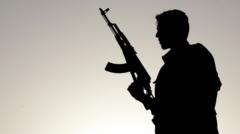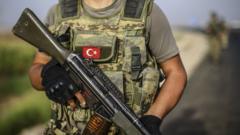The recent announcement by the Kurdistan Workers' Party (PKK) to disband has sparked mixed emotions among families of fighters, intertwining hope for reconciliation and fear of lost futures in a conflict laden with bloodshed.
Kurdish Families Await Uncertain Future After PKK's Disbandment Announcement

Kurdish Families Await Uncertain Future After PKK's Disbandment Announcement
Families of PKK fighters express hope and despair as the group vows to end its 40-year conflict with Turkey.
In a remote part of the Qandil Mountains, a region cloaked in the complexities of Kurdish identity and resistance, families of those who have joined the PKK reflect on the organization's recent commitment to disbanding after a 40-year struggle with Turkey. The announcement ignited a flicker of hope for Leila, whose son left home three years ago to fight alongside the outlawed group, previously interpreted as a terror organization by Turkey, the US, UK, and the EU. Despite her initial optimism, Leila shares a growing sense of disbelief as no formal peace process has taken shape since the announcement was made.
Over the years, the PKK's fight has resulted in the loss of more than 40,000 lives, predominantly civilians. The families are split in their sentiments; while some condemn the PKK's actions, others view their loved ones' sacrifices with pride, believing these losses have catalyzed the potential for dialogue and peace.
The PKK declared its intention to cease hostilities, a moment seen by many as historic for both Turkey and its Kurdish minority, as well as surrounding nations facing the spillover effects of conflict. However, the absence of a formal ceasefire or renewed peace talks, coupled with ongoing violence, cast a shadow over what is meant to be a transformative moment.
Leila's son, an Iraqi-Kurd, succumbed to what she refers to as "brainwashing," captivated by the PKK's narrative of defending the Kurdish people across four nations. Despite her attempts to dissuade him from joining the fighters, he left, emboldened by the cause, leaving behind a mother desperate for reconnection.
In a revealing journey to the mountainous stronghold of the PKK, the BBC witnessed the group’s concealed operations and symbolic displays of allegiance to their leader, Abdullah Ocalan, who has been imprisoned for over two decades. Despite requests for access, the PKK rebuffed media presence amid claims of negotiation efforts happening quietly and away from the public eye.
Clear paths towards disarmament remain uncharted territory. A PKK spokesperson insists peace cannot be enacted without the release of Ocalan, emphasizing the necessity of reciprocal goodwill to facilitate dialogue. Yet, on-the-ground commanders voice reservations about disarmament, believing it to be a moot discussion until the deeper issues fueling the conflict are effectively addressed.
For families like Rondek's, who mourn while cherishing memories of beloved ones lost in the struggle, the prospect of peace is tinged with nostalgia and sorrow. As she recalls her brother Kawa, who was killed while fighting, she voices the dual emotions elicited by the disbandment—the bittersweet essence of pride and unresolved grief.
Questions loom over the future of thousands of PKK fighters should true disarmament occur. Will the state embrace a reconciliatory approach towards returnees? Or will fear of prosecution cast a long shadow over their reintegration into society? The complexity of these dynamics extends well beyond Kurdish borders, potentially impacting other armed groups such as the YPG in Syria, which Turkey considers a PKK offshoot.
As the narrative unfolds and hopes intertwine with fears, for parents like Leila, the only enduring reality is the profound longing for their children’s return. For her, the complexities of political intrigue pale in comparison to the singular desire to alleviate a personal heartache that encapsulates years of conflict. "This city has brought me nothing but pain," she says, envisioning a future far removed from the circumstances that cost her son so dearly.
Over the years, the PKK's fight has resulted in the loss of more than 40,000 lives, predominantly civilians. The families are split in their sentiments; while some condemn the PKK's actions, others view their loved ones' sacrifices with pride, believing these losses have catalyzed the potential for dialogue and peace.
The PKK declared its intention to cease hostilities, a moment seen by many as historic for both Turkey and its Kurdish minority, as well as surrounding nations facing the spillover effects of conflict. However, the absence of a formal ceasefire or renewed peace talks, coupled with ongoing violence, cast a shadow over what is meant to be a transformative moment.
Leila's son, an Iraqi-Kurd, succumbed to what she refers to as "brainwashing," captivated by the PKK's narrative of defending the Kurdish people across four nations. Despite her attempts to dissuade him from joining the fighters, he left, emboldened by the cause, leaving behind a mother desperate for reconnection.
In a revealing journey to the mountainous stronghold of the PKK, the BBC witnessed the group’s concealed operations and symbolic displays of allegiance to their leader, Abdullah Ocalan, who has been imprisoned for over two decades. Despite requests for access, the PKK rebuffed media presence amid claims of negotiation efforts happening quietly and away from the public eye.
Clear paths towards disarmament remain uncharted territory. A PKK spokesperson insists peace cannot be enacted without the release of Ocalan, emphasizing the necessity of reciprocal goodwill to facilitate dialogue. Yet, on-the-ground commanders voice reservations about disarmament, believing it to be a moot discussion until the deeper issues fueling the conflict are effectively addressed.
For families like Rondek's, who mourn while cherishing memories of beloved ones lost in the struggle, the prospect of peace is tinged with nostalgia and sorrow. As she recalls her brother Kawa, who was killed while fighting, she voices the dual emotions elicited by the disbandment—the bittersweet essence of pride and unresolved grief.
Questions loom over the future of thousands of PKK fighters should true disarmament occur. Will the state embrace a reconciliatory approach towards returnees? Or will fear of prosecution cast a long shadow over their reintegration into society? The complexity of these dynamics extends well beyond Kurdish borders, potentially impacting other armed groups such as the YPG in Syria, which Turkey considers a PKK offshoot.
As the narrative unfolds and hopes intertwine with fears, for parents like Leila, the only enduring reality is the profound longing for their children’s return. For her, the complexities of political intrigue pale in comparison to the singular desire to alleviate a personal heartache that encapsulates years of conflict. "This city has brought me nothing but pain," she says, envisioning a future far removed from the circumstances that cost her son so dearly.




















